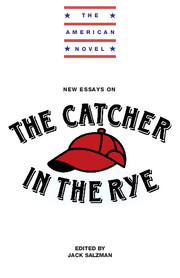Book contents
- Frontmatter
- Contents
- Series Editor's Preface
- 1 Introduction
- 2 Holden in the Museum
- 3 Holden's Museum Pieces: Narrator and Nominal Audience in The Catcher in the Rye
- 4 Pencey Preppy: Cultural Codes in The Catcher in the Rye
- 5 Holden Caulfield and American Protest
- 6 Love and Death in The Catcher in the Rye
- Notes on Contributors
- Selected Bibliography
4 - Pencey Preppy: Cultural Codes in The Catcher in the Rye
Published online by Cambridge University Press: 05 June 2012
- Frontmatter
- Contents
- Series Editor's Preface
- 1 Introduction
- 2 Holden in the Museum
- 3 Holden's Museum Pieces: Narrator and Nominal Audience in The Catcher in the Rye
- 4 Pencey Preppy: Cultural Codes in The Catcher in the Rye
- 5 Holden Caulfield and American Protest
- 6 Love and Death in The Catcher in the Rye
- Notes on Contributors
- Selected Bibliography
Summary
HOLDEN Caulfield, like Huck Finn, has become a mythic figure of adolescent rebellion in American culture. One continuing rich source for this presentation of Holden, usually as a rebel against the conformist pressures of post–Second World War American society, is the American history textbook designed for high school use. In a typical example, Daniel F. Davis and Norman Langer, authors of A History of the United States Since 1945, argue that Holden's “adventures say a great deal about the worth of the individual in American society. They also remind readers how vulnerable every individual can be.” This analysis forms part of a chapter in their textbook entitled “Literature: The Individual and Society,” in which the conformist society against which Holden rebels is constructed out of a number of sociological studies of the American character published at about the same time as The Catcher in the Rye. One book of this type, David Riesman's The Lonely Crowd (1950), provides their descriptive model of the ideology of modern American society against which Holden is seen as making an individualistic stand. They paraphrase Riesman as follows:
As societies become more technologically advanced, Riesman argued, parents give up some of their authority to other institutions such as schools, the mass media, and peer groups. … Riesman called this new society “other-directed.” […]
- Type
- Chapter
- Information
- New Essays on The Catcher in the Rye , pp. 57 - 76Publisher: Cambridge University PressPrint publication year: 1992



